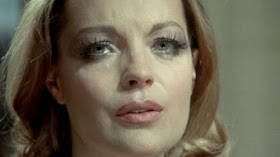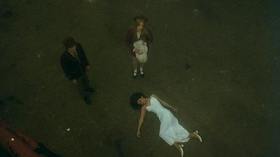How does she manage it? Well, she's a hottie, tall and true, and heads above the rest -- with the rare hat trick of perfect confidence, down home naturalism, irreversible conviction, and sublime grace (not for nothing that's her name in DOGVILLE). Her character might seem to let herself be blankly led through life, but only so her snapping awake and lashing out has extra oomph. At times seeming to be both the best and worst actress at the same time, she's fearlessly sexual yet always remote. Dissatisfied and in no mood to hide it or even change it, she slithers between moral extremes, from the shy twinkle of silent film virgins like Lillian Gish to the unapologetically homicidal sirens like Fu Fah Lo Suee in MASK OF FU MANCHU (1932). For a prime example, please see BIRTH and play close attention to the sex scene early on, and the long take of her face at the concert. No one is better at conveying the moment when sex 'switches on' from just fooling around to, ahem. A singe eye pop at a key moment, a fleeting look in her face of surprise, pain, pleasure, indignity, gratitude and impish delight and even fury all flash across, it's a look men seldom see being indisposed in the act, so for us--to see it now--is to find some magic room in the holiest of our holy temple.
Now, hold that thought while we discuss Arab extremists and the "crime" of cartoonists drawing their prophet, Muhammad. First, SOUTH PARK and whomever should be allowed to poke fun at anyone without fear of terrorist attack, but at the same time, we must bear in mind that the Muslim distrust of images has a sound grounding in "reality" - that is to say, they don't want to be hypnotized into a false reality; the want to keep their art purely decorative rather than representational. Considering the extent to which we--the rest of the world--are so hypnotized, and how that can be construed as 'graven image bowing', it's hard to just wave off that wish as mere fundamentalist dogma.
Consider these anti-image extremist the opposite of Kidman's split subject. It's hard for us to imagine it--all media-hypnotized as we are here in the belly of the beast--but pretend you're watching a great movie and you're really into it and suddenly it's your life, there's no more dividing up your energy between fantasy and reality. Where the split world--our world-- protests governmental atrocities by getting depressed and then getting some catharsis watching stuff blow up in Bruce Willis movies, the extremists are their own Bruce Willises. For them, perhaps, explosives are less dangerous than the seductive allure of desire-driven commodification aesthetics. Earthly death is nowhere near as terrible (for them) as the soul-eating vortex of the simulacrum. And who's to say they're wrong? Plato?
That's where Nicole Kidman and BIRTH and EYES WIDE and of course TO DIE FOR all come rolling in. When the platonists and the extremists threaten to exterminate the image and the alluring veils of desire, capitalism, and commodified aesthetics, Kidman parachutes in like Maya, the Hindu goddess of illusion. Kidman's sexuality is such that operates both within the seductive lure and without. She overflows the boundaries of her films. She's above the fray, but where is there to go other than down?
TO DIE FOR tells the story of a girl who lives and breathes the desire to do the local evening news. She sleeps her way in, blackmails her way up, and murders all the way to the top, seducing poor Joaquin Phoenix into doing her dirty work. In DOGVILLE, we see the college education of the mediated celeb – the "slumming" of the elite, seeing how the other half lives and the eventual rejection of the townie mindset, with a bullet. This leads us to BIRTH and EYES WIDE, and the bitchy end-products of the social climbing. In EYES WIDE, for example, Kidman's wealthy uptown girl bristles at the fallow narcissism of her short, wealthy husband (Tom Cruise). He's 100% in the simulacrum and she at least has one foot outside it. All she has to do to set off her man is paint a picture in his mind of her fantasy ravishment at the hands of a lusty sailor and he's off tearing up the town, or rather, sauntering up to it and when it starts to tear back, running away like a little wuss.
Kidman's reality is that she just locked eyes with the sailor 'in real life.' She only imagines having the affair, a fantasy that no real sex with the man you've had a kid with can ever match. She accepts that and can live in both the imaginary and real levels, unlike say, Tom Cruise, who can't quite understand why her fantasy is so vivid in his mind. He ends up going to great lengths – renting costumes and taking cabs out to Long Island in the dead of night – to try and reconcile this split so he can escape the mirror, but even then he's too uptight and bound by desire to participate, because to participate would end the fantasy and thrust him into disillusionment and the real, which is actually what he wants but he doesn't quite know it. Sadomasochism and orgies are, in the end, perhaps truly enjoyable only as literature. When you make them real, something goes missing.
Observe the photo still from EYES above: Nicole fixes an earring and looks over at Cruise in the mirror as he comes towards her, his eyes flashing himself a come-on like a narcissist in a candy store. Note that we don't see the sexy Cruise persona outside of the mirror-the figure in the far right of the image above seems like someone else, his arm lumpy, his nose big, his mouth slack--it's as if he doesn't even realize there is an outside to the mirror at all and so leaves it blank. Like many actors, he sees himself from afar, the way a video gamer sees his avatar so sudden proximity exposes his Brundlefly-like nature.The veiled contempt with which she observes the scene seems to indicate she understands this split; she's outside and inside the mirror; fully conscious of her unconscious.
Validated by his medical profession, Tom thinks there is only "this" reality, the one where he is rich, good looking and sociable. To even imagine a universe where money and social standing doesn't matter is beyond him, and the film is about him coming to grips with that, trying to crash a party out of his league and otherwise fumbling with the keys to physical gratification. Thus it's with ease that Nicole sends him hurtling through the Manhattan night; all she has to do is suggest the image in the mirror could be read in an entirely different way, as a mask; once outside the costume ball his mask – his medical authority, wealth and privilege – don't mean shit.
Similarly, masks, doubles, and mirror images are all evil concepts to a fundamentalist religion wherein reuniting splits and bringing everything back to a tangible, universal real is so important, especially since the fantastic imagery being force fed to them is not "theirs" per se, but the American dream machine juggernaut that streamlines all reality into a Wal-Mart /Starbucks strip mall. Thus the threats to the makers of graven images of Muhammad stems from this line-in-the-sand approach. "Make fun of us if you want, just leave this one thing unattacked." But of course we've lost so much in gaining all our cool shit, we can't even begin to understand that kind of deep devotion. We've forgotten we have a mask on and we resent being asked to take it off just as much as the fundamentalists resent us wanting to put one on their prophet.
But again, it can all be solved by looking at Nicole Kidman, that rare creature that seems able to exist in two places at once, the personification of that simulacrum/illusion present in the brief moment between putting the mask on and taking it off. There's not a "censored" black bar in the world that can hide her awesome cinematic body or stop her from arousing men (and women), distracting them from their prayers, and creating earthquakes enough to destroy the world. No amount of explosive or patriarchy can contain her. I love her, because she melts down my I, and all others, until we're just an empty mask drifting feather like to the bottomless floor.



























.jpg)













